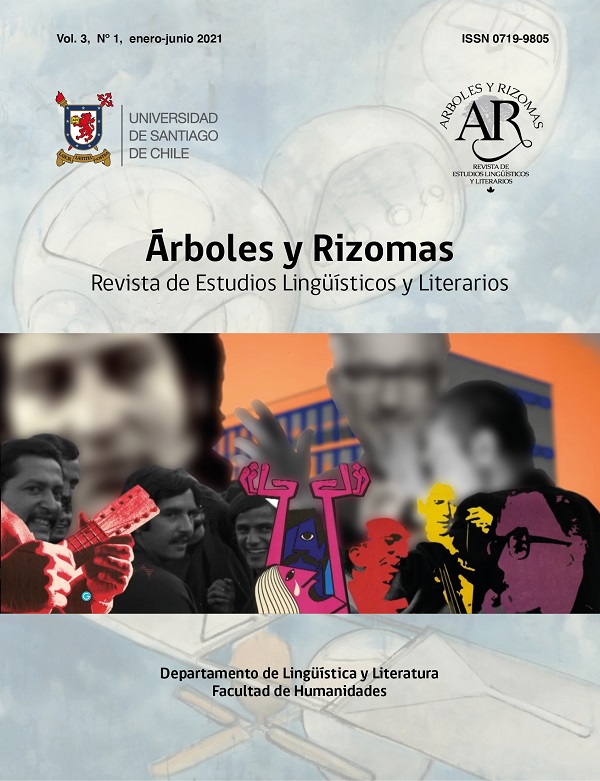Double consciousness in the short story “Children of the sea” by Edwige Danticat
DOI:
https://doi.org/10.35588/ayr.v3i1.4681Keywords:
Haiti, double consciousness, Afro-descendants, orality, black feminism, historyAbstract
This article studies the double consciousness in the structure and content of the story "Children of the sea". The double consciousness reveals the different subjectivities that constitute the author's writing as an Afro-descendant, a migrant and a woman. The analysis is based on a review of feminist and Caribbean literary criticism about the use of orality, as well as on a historical exploration that associates the forced migration of African people to migrations caused by political violence. Additionally, we use theoretical references that explain the dual identity. We conclude that the fragmentation into two voices creates a third narrative that integrates feminine, Afro-descendant, and Haitian aspects that have been made invisible by Western culture.
Downloads
References
Adichie, C. N. (2018). El peligro de la historia única. Barcelona: Literatura Random House.
Aspedilla, W. (2020). Pensamiento feminista negro en las novelas Cosecha de Huesos de Edwidge Danticat y Rosalía la infame de Évelyne Trouillot. Tesis para optar al grado de Magister en Literatura Latinoamericana y Chilena. Unversidad de Santiago de Chile, Santiago.
Chancy, M. J. (1997). Framing silence: Revolutionary novels by Haitian women. New Brunswick, New Jersey: Rutgers University Press. Edición Kindle.
Christian, B. (1985). Black feminist criticism: perspectives on Black women writers. Nueva York: Pergamon Press.
Collins, P. H. (2009) Black Feminist Thought Knowledge, consciousness, and politics of empowerment. New York: Routdlege.
Cope, R. (2017). "We are your Neighbors": Edwidge Danticat's New Narrative for Haiti. Journal of Haitian Studies 23(1), 98-118.
https://doi.org/10.1353/jhs.2017.0004
Correa, J. (2016) La inmigración como “problema” o el resurgir de la raza. Racismo general, racismo cotidiano y su papel en la conformación de la Nación. Racismo en Chile. La piel como marca de la inmigración, p. 35-45.
Danticat, E. (1999) ¿Cric? ¡Crac! Bogotá: Editorial Norma.
—. (2007) Brother, I’m dying. New York: Vintage.
—. (1998) The Farming of Bones: A novel. New York: Soho Press.
—. (2019) Crear en peligro: El trabajo del artista migrante. Santiago: Banda propia.
—. Haití: una experiencia entre dos culturas. (1995) Nueva York: Conferencia Centro cultural del BID, N° 12. https://publications.iadb.org/publications/english/document/Haiti-A-Bi-Cultural-Experience.pdf
Davies, C. B. (1990). Out of the Kumbla: Caribbean women and literature. Trenton, New Jersey: Africa World Pr.
Davis, R. (2001) Oral Narrative as Short Story Cycle: Forging Community in Edwidge Danticat's ‘Krik? Krak!’ MELUS, 26(2): 65-81.
https://doi.org/10.2307/3185518
Díaz, A. V. (2009). Edwidge Danticat y el cruce de fronteras entre Haití, África y América. Cuadernos del Ateneo(28): 85-92.
Du Bois, W.E.B. (2008). The souls of the black folk. New York: Oxford University Press.
Gleibermann, E. (2019). The Story Will Be There When You Need It. World Literature Today, 93(1), 68. http://proxy.library.stonybrook.edu/login?url=https://www-proquest-com.proxy.library.stonybrook.edu/docview/2161594845?accountid=14172
Gilroy, P. (2014) Atlántico negro: modernidad y doble conciencia. Madrid: Akal.
Hodge, M. (1970) Crick Crack, Monkey. London: Heinemann.
Laso, J. (1970) Blanc y Black. Santiago: Editorial Universitaria.
Lyons, B., & Danticat, E. (2003). An Interview with Edwidge Danticat. Contemporary Literature, 44(2): 183-198.
https://doi.org/10.2307/1209094
Márquez, R. (2002) Raza, racismo, historia: ¿vienen de allá todos mis huesos? Pizarro, Ana (compiladora), El archipiélago de fronteras externas (185-201) Santiago: Editorial Universidad de Santiago.
Meenakshi, P., & Mathews, S. M. (2018). Love, Suffering, and Hope in Edwidge Danticat's" Children of the Sea". Language in India, 18(2).
Misrahi-Barak, J. (2006). “My mouth is the keeper of both speech and silence€”, or The Vocalisation of Silence in Caribbean short stories by Edwige Danticat. Journal of the Short Story in English. Les Cahiers de la nouvelle, (47).
Moya, F. (2001) Historia del Caribe. Barcelona: Crítica.
Nicholls, D. (1996) From Dessalines to Duvalier: race, colour, and national independence in Haiti. New Brunswick, New Jersey: Rutgers University Press.
Oliva, M.E. (2010) Identidad, migración y memoria en la literatura caribeña de Edwidge Danticat. América Latina en el nuevo milenio: procesos crisis y perspectivas. Santiago: CECLA. Universidad de Chile: 109-130.
Pizarro, A. (2002) El archipiélago de fronteras externas. El archipiélago de fronteras externas. Santiago: Universidad de Santiago: 15-30.
Sanders, G. L. (2013). La Voix des Femmes: Haitian Women's Rights, National Politics, and Black Activism in Port-au-Prince and Montreal, 1934-1986 (Doctoral dissertation).
Shea, R. (1995). Belles Lettres Interview: Edwidge Danticat. Belles Lettres, 10: 12-15.
Stecher, L. (2016) Narrativas migrantes del Caribe: Michelle Cliff, Jamaica Kincaid y Edwidge Danticat. Buenos Aires: Corregidor.






